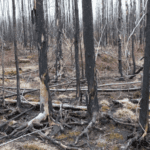Labwork.
We all know it. It’s tedious, monotonous, dull… A means to an end. The worst part of conducting research. A struggle. A pain. Boring.
But now that I am a few years removed from a research practice, I miss it—not in spite of these qualities, but because of them. Within the monotony of lab work one can find the time to slow down, take a break, get off of Twitter (unless you’re using it solely for great science communication), escape the internet, and unplug.
It can be hard to find peace in 2018. For me, it seems as though these past two years have been a never-ending, dread-inducing deluge of information about the horrific state of our world. And it just so happens that the last time I picked up a pipette was also two years ago.
Disconcerting news cycles of xenophobia, misogyny, racism, and sexual assault happening in the highest levels of government make us question if this is the world we want to live in, while climate scientists remind us that very same world may be lost if we don’t radically change our lives in the next decade.
It’s enough to dull even the brightest of spirits.
Personally, I have struggled with depression for more than a decade. In those 10 plus years, I have come to understand that my sadness is more manageable when I incorporate some sort of mindfulness practice into my everyday routine. Yoga, meditation, intentional walking, and, of course, working at a bench.
Studies suggest that mindfulness and meditation can help alleviate anxiety and depression, boost pro-social behaviours, increase productivity, and even change our brains. One study presented evidence that the amount of grey matter in regions associated with emotional regulation increased in meditators, while another suggested that meditation increases not only brain activation, but also boosts immune response to influenza). But these results are contentious and not all scientists agree on the merits of meditation.
Meditation is often done through the most mundane task of all, one that we don’t even notice most of the time—breathing. The monotonous can be mindful if you treat it as such. By doing repetitive lab work with deliberate intent, fully immersing yourself in something that is otherwise boring, you can find refuge in something that could easily be suffocating.
Additionally, mindfully conducting research means it is more carefully done. If you aren’t rushing to load a gel, then you are unlikely to overload a well and lose your sample. Mindfully conducting research means doing it right the first time.
Lab work is intermittent. Everyone experiences uptime and downtime. Cells need to grow. Programs need to compile. Your brain can only do math for so long. Reactions need to proceed. Animals need to sleep. Tissue staining takes time.
Some of this downtime is long—long enough to do another task. But the rest is perfect for mindfulness.
These moments of downtime are often too short to do anything else at all. If you are waiting one minute for a centrifugation to end, it’s not even worth it to pull out your phone—considering you’d have to take off your gloves and put them back on to bookend your online experience. So what else are you to do other than listen to the motor whirling?
These short moments that punctuate a day’s worth of lab work let you simply breathe and wait. It’s meditation in an unconventional way but meditation nonetheless.
And for those of you who conduct your research out in the field, being in an internet dead zone is even more of a break from the bustle of the online. Marveling at the natural beauty of our world happens countless times out in the field and allows us to take time to pause.
Although some studies suggest meditation has great promise, the scientific consensus on mindfulness is still unclear.
The current research around mindfulness is inconsistent, and studies are often flawed—there isn’t a strong consensus amongst studies defining what mindfulness and meditation actually are. Standardization has yet to be developed for mindfulness researchers, and that jeopardizes the integrity of these studies.
Mindfulness won’t work for everyone. For a complex issue like depression, nothing can be a one-stop catchall. It’s also possible to immerse yourself too much in your research, which can also lead to poor mental health. So don’t think that conducting mindful research 24/7 will make you feel better either. Rather, I hope you just view the drudgery of your scientific practice in a new way.
Some of these skeptics believe that mindfulness and meditation are no more effective than the placebo effect.
Even if this is true, it doesn’t’t personally matter that much to me, a science communicator and lapsed scientist, as you might think. In a world where there are countless things that could potentially induce the placebo effect in me to lessen my depression, I know that the one that works well—placebo or not—is meditation.
And if it works for me isn’t that enough?
Other things help too, but they have their drawbacks. Medication works to an extent, but most antidepressants make my ears ring. Therapy is wonderful! But the bills rack up quickly. If meditation and mindfulness are not as effective as the hype around them make it seem, that’s okay with me.
The hardest part about incorporating mindfulness practice into my fight against my depression is making the time to do so and forcing myself to do it. When I was actively conducting research, I didn’t have to worry about it. It was built in to my everyday routine.
So the next time you find yourself in the depths of lab work drudgery, don’t despair. Rather, think about how this may be the perfect opportunity for you to disconnect, immerse yourself in your research, and breathe.




